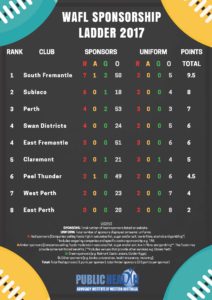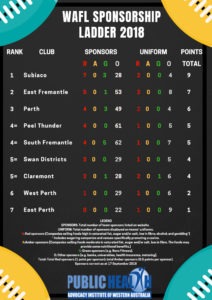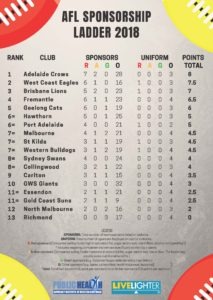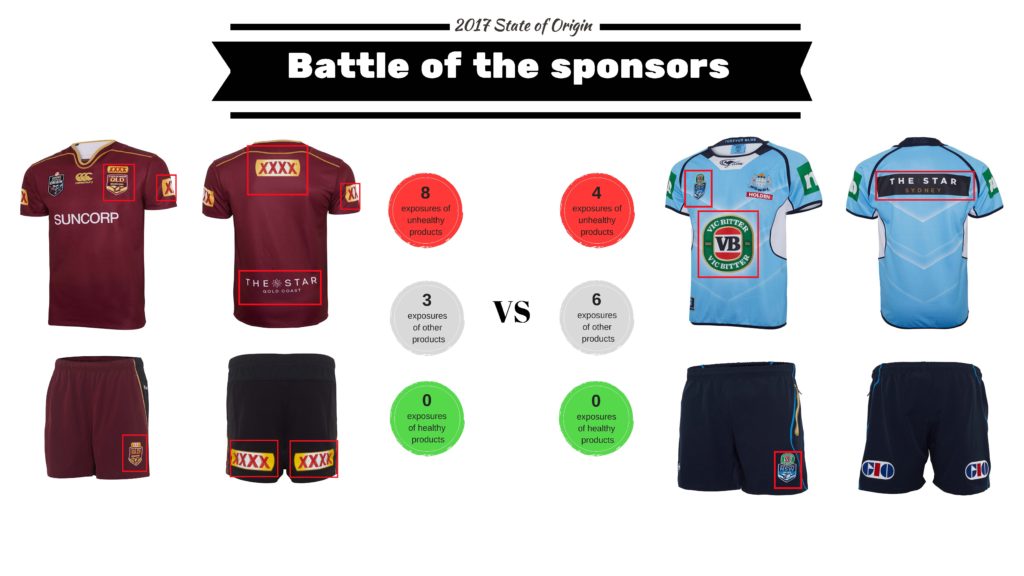Sponsorship in Sports
Project Overview
Why are we concerned about Sports Sponsorship?
Unhealthy sponsorship agreements infiltrate all levels of sport. We know that children are influenced by food brands. Studies have shown children can recall sponsors connected to sport, they think sponsors are ‘cool’, and say they would buy a product to return the favour to sponsors. We also know that developing brand loyalty at a young age also seeks to ensure lifelong product purchases.
Corporate sponsorship of events and organisations’ represents one form of marketing to which children are exposed. PHAIWA is interested in a number of unhealthy commodities associated with sports sponsorship including alcohol, gambling and fast food.
PHAIWA has a focus on developing tools, fact sheets and reports to increase the awareness of the extent of unhealthy sports sponsorship to enable individuals, clubs and organisations’ to advocate for change.
Projects
The role of corporate social responsibility (CSR) policies in the unhealthful sponsorship of sports in Western Australia.
PHAIWA undertook a qualitative research project in the first half of 2017, aiming to identify the role of corporate social responsibility (CSR) policies in the unhealthful sponsorship of sports in Western Australia. You can read the executive summary here.
AFL and WAFL Unhealthy Sponsorship Ladders
AFL Unhealthy Sponsorship Ladder 2020 Update
Due to COVID-19 impacting on a reduced level of live crowd numbers, reduced televised games, rejigging of fixtures, shortened quarters and constant changing of state and local regulations, PHAIWA has decided to suspend the AFL unhealthy ladder project for 2020. We will be back in 2021, showcasing and congratulating those AFL and WAFL clubs that choose to partner and take sponsorship from industries that do not promote junk food, alcohol and gambling.
AFL Sponsorship Ladder 2019
PHAIWA has completed a review of AFL sponsors highlighting those teams who have the least healthy sponsors. You can see how each team ranks on the 2019 AFL Sponsorship Ladder.
The overwhelming majority of AFL clubs were sponsored by at least one company that promoted junk food, alcohol or gambling products during the 2019 AFL season, our review found that 17 of the 18 AFL clubs were sponsored by at least one ‘red’ sponsor, with six of the teams having unhealthy sponsors on their playing uniform. For the second year in a row, Richmond Football Club was the only AFL club that had zero ‘red’ or ‘amber’ sponsors.
The Adelaide Crows are at the bottom of the unhealthy Sponsorship Ladder. In 2017 they had 5 Red sponsors, 2018 they had 7, and in 2019 they have 8, with the number of clubs with an unhealthy sponsor on their uniform has increased from 5 in 2018, to 6 in 2019. Melbourne now featuring the Johnnie Walker logo on their shorts.
Unhealthy sponsorship in the form of junk foods, sugary drinks, alcohol and gambling are saturating our favourite winter sport. We categorised sponsors according to the healthiness or unhealthiest, allocated points and those clubs with the highest number of unhealthy sponsors were ranked at the bottom of the sponsorship ladder.
WAFL Sponsorship Ladder 2017 and 2018
PHAIWA has completed a review of WAFL sponsors highlighting those teams who have the least healthy sponsors. You can see how each team ranks on the 2017 and the 2018 WAFL Sponsorship Ladders.
In 2017 and 2018, eight out of nine WAFL Clubs had two Red sponsors or more. In 2018 Subiaco has the most Red sponsors with seven. Notably, South Fremantle has improved by dropping from seven to four unhealthy sponsors, and increased healthy sponsors from two to five. East Perth continues to not have any Red sponsors. There are 5 WAFL Clubs with Green sponsors this year, as compared to last year when there were 4 Green sponsors.
In 2018, all WAFL Clubs, except for Subiaco, have removed one Red sponsor from their uniform. Claremont remains the only WAFL Club with one Green sponsor on their uniform. It is encouraging to note that only 4 teams display an alcohol related logo on their uniforms this year when all WAFL teams were doing so last year.
State of Origin
Media Release – Battle of unhealthy sponsors in State of Origin
The XXXX Queensland Maroons will have twice as many examples of unhealthy advertising on their uniforms as the VB New South Wales Blues in next week’s Game One of the 2017 Holden State of the Origin, Curtin University research has found. The Public Health Advocacy Institute of Western Australia (PHAIWA), based at Curtin University, found eight exposures of unhealthy sponsorships on Queensland’s uniforms, compared to four for New South Wales. Neither team had any healthy sponsorships displayed on their uniforms.
PHAIWA Director Dr Melissa Stoneham said Game One of the 2016 State of Origin series broke television ratings records with 4.423 million people tuning in to watch.
“It is disappointing to see alcohol and gambling advertising attracting such prominence on the uniforms worn by NRL players when millions of people including children will be watching the State of Origin series,” Dr Stoneham said.
“I was particularly concerned to see both teams are named after their alcohol sponsors. NRL teams should not be sponsored by unhealthy brands because they send negative health messages to the public, including children.”
The review was conducted in conjunction with the Foundation for Alcohol Research and Education (FARE).
FARE Chief Executive Officer Michael Thorn said he hoped to mobilise community support for a campaign, called #BoozeFreeSport, which aimed to remove alcohol sponsorship from sport.
“State of Origin should showcase the great game of Rugby League,” Mr Thorn said. “Instead, Australian kids are exposed to a battle of the beer brands, 80 minutes of in-your-face, shameless alcohol advertising and promotion. This is exactly the toxic alcohol advertising in sport that our campaign, #BoozeFreeSport, is aimed squarely at.”
To read the article written by PHAIWA’s Dr Melissa Stoneham, Melinda Edmunds and Ainslie Sartori published on drinktank, click here.
Resources and Publications
Richmond Tigers on top when it comes to sponsorship
In 2019, the Tigers were once again the only AFL team with no unhealthy sponsors. Given their performance that season, it has become apparent that alcohol, gambling, and junk food sponsors aren’t necessary for a team to do well on the field. To read more click here.
Unhealthy sponsorship in sport: a case study of the AFL
PHAIWA has compiled the findings of our research analysing the presence of unhealthy sponsorship on AFL websites and player uniforms. The article was published on the Australian and New Zealand Journal of Public Health. It is available to read here.
Who owns who in the Australian food market?
Read Dr Melissa Stoneham and Ainslie Sartori’s blog on Croakey on the food map created by PHAIWA here.
The Olympics: faster, higher, stronger … unhealthier?
This blog examines the sponsorship of the 2016 Rio Olympics – which really was just a carnival of junk food!
Media
See below for the media coverage on PHAIWA’s research on sponsorship in sport.
Radio
ABC North West
Vision Radio Sat 1 Sep (Podcast – Ainslie comes on at the 53 min mark)
https://varadio.podbean.com/e/lesiure-link-1-sep-2018/
Other articles and blogs
Fremantle Gazette
South Fremantle labelled worst in the WAFL for unhealthy sponsorship
Sports Business Daily
Nearly half of Western Australia Teams Have at Least One ‘Unhealthy’ Sponsor.
Sydney Morning Herald
Nearly half of WA sporting teams have at least one unhealthy sponsor.





